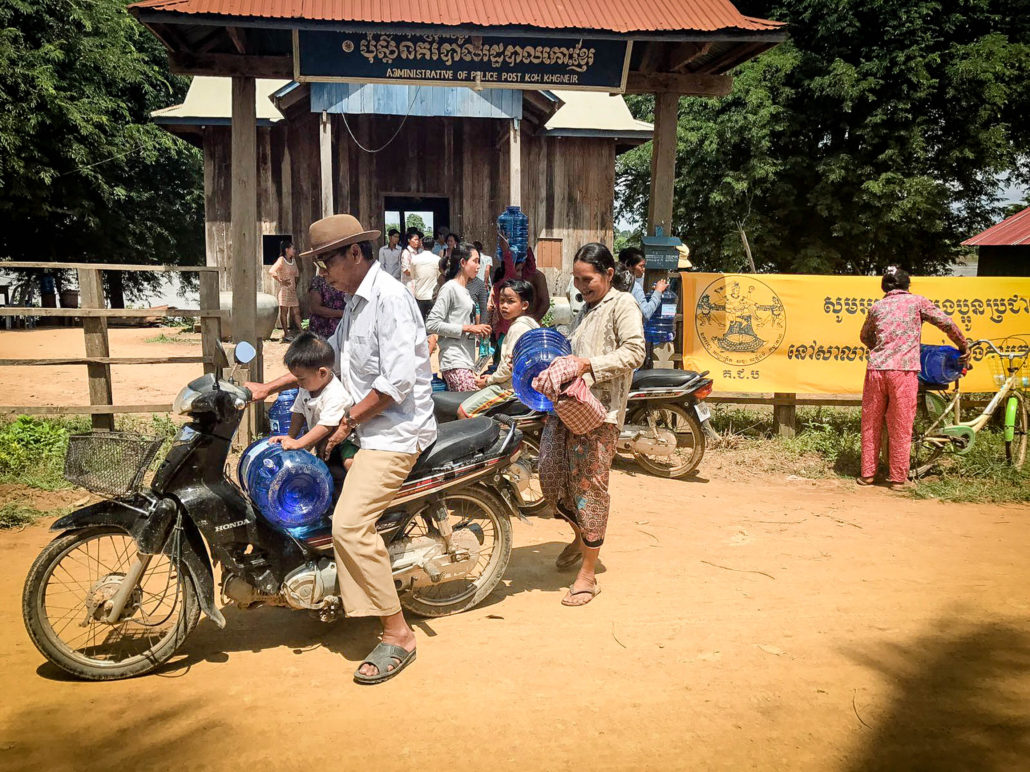PRESS RELEASE: Community water projects benefit 4,000 in Ayeyarwady Region
July 2019, Ayeyarwady Region– Some 4,000 people from five rural villages in Myaungmya District in the Ayeyarwady Region will have improved water supply following their participation in the Lien AID Community Water Management programme.
Non-profit organisation Lien AID, in partnership with the Department of Rural Development (DRD), local civil society organisation Karunashin, and water management committees from participating villages, have completed water projects in the villages of Dagon May, Dar Mya Chaung, Gyaung Shae, Me Kyaw, and Nyaung Chaung Lay. These projects have been generously co-funded by the Ministry of Foreign Affairs, Singapore.
Village leaders and representatives from each of the five villages took ownership of the established community water services at a handover ceremony today at the Fuji 2 Hall in Myaungmya township. Singapore’s Ambassador to The Republic of the Union of Myanmar, Vanessa Chan; Chairman of Lien AID, Laurence Lien; Myaungmya Township Members of Parliament; the Myaungmya DRD; Chief Officers from Myaungmya Township Departments; Village Tract Administrators; and many Doh Yay heroes, attended the event.
The Chief Officer of Myaungmya Township DRD, U Nay Lin Soe shared, “The success of this project, which has been hugely beneficial to the rural communities, is due to the enthusiastic collaboration of all related stakeholders in their respective roles and responsibilities. I believe this kind of collaboration lays the ground for similarly successful future projects.”
The type of improved water infrastructure constructed in each village varied based on proposals from the water management committees. In Dagon May, an old village pond damaged by Cyclone Nargis was rehabilitated, while new rainwater harvesting ponds were built in Dar Mya Chaung, Gyaung Shae and Mae Kyaw. The ponds are equipped with perimeter fencing and hand pumps to protect the water from contamination and overuse. In Nyaung Chaung Lay, a new 10,000-gallon rainwater harvesting and storage tank was built to complement existing water resources.
880 students and from 3 village schools in Dagon May, Me Kyaw, and Nyaung Chaung Lay, will also benefit from clean water and sanitation through improved water supply, latrines, and handwashing facilities in the schools. Workshops that were conducted for the village representatives and water management committee members will enable them to manage, operate, and maintain the village infrastructure to deliver sustainable water and sanitation services for their communities.
In late 2017 Lien AID launched the Community Water Management programme to empower local actors in the Ayeyarwady to implement clean water projects and manage water resources in their communities. The programme establishes an inclusive, ground-up approach to the planning and delivery of rural water services in Myanmar.
When completed in early 2020, it is expected the Community Water Management programme will reach more than 25,000 people across 35 villages with improved supplies of clean water; and over 2,000 students from 20 village schools with improved latrines, handwashing facilities, and water supply within their schools.
Speaking at the handover, Lien AID’s Chairman, Laurence Lien said, “Clean water and sanitation is essential for basic living. It is especially important for the healthy development of a child. Lien AID is honoured to have played a role in bringing water solutions in Myaungmya. We are heartened to see strong collaboration between township governments and villages in establishing sustainable clean water and sanitation services for at-risk communities. Our presence here reflects our commitment to engaging and empowering local actors in Myanmar to improve the health and well-being of children and communities through universal access to safe water and sanitation.”
Apart from the Community Water Management programme, Lien AID is also working on new initiatives to strengthen local water and sanitation systems in Myanmar. In Myaungmya last month, with the support of the Chief Administrator of the Township General Administration Department and the Chief Officer of the Township Department of Rural Development, Lien AID convened a township working group with representatives from across key Township Departments. Members of the working group will collaborate to improve water supply for households, in line with Myanmar’s National Water, Sanitation, and Hygiene Strategy.
Across the Ayeyarwady Region, Lien AID will support partner townships in finding cost-effective solutions for sustaining and scaling water and sanitation services, and safe hygiene behaviour, to improve the health and well-being of disadvantaged and at-risk communities.





























